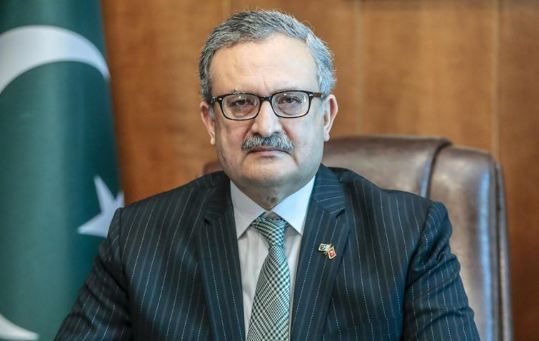GENEVA, Feb 27 (APP/DNA): Pakistan’s ongoing peaceful transition of power following the February 8 “fair” election demonstrated the strength of the country’s democratic tradition and values, Foreign Secretary Syrus Sajjad Qazi has said.
“Tens of millions of Pakistani citizens freely exercised their fundamental right to vote,” Qazi told the high-level segment of the United Nations Human Rights Council ‘s 55th session which began in Geneva on Monday.
Pakistan, he said, was a staunch supporter in promoting universal respect for human rights, and remains a strong voice for protection, and indivisibility of all human rights.
“We have always endeavoured to foster dialogue, mutual understanding, and consensus at the Council,” the foreign secretary added.
Pakistan, he said, had also contributed to the 47-member Council’s work in areas of social and economic rights; religious intolerance; disinformation; rights of children, older persons and persons with disabilities; and the frontier issue of emerging technologies.
“Despite many exogenous challenges,” the foreign secretary said, “our investment in strengthening social safety nets and improving standards of education and health continue”, adding that an independent media and a strong civil society enrich Pakistan’s human rights discourse domestically.
“A few weeks ago, despite serious threat of foreign sponsored terrorism, Pakistan successfully held a peaceful and fair election… The peaceful transition of power, which is underway, demonstrates the strength of our democratic tradition and values which are essential to the enjoyment of civil and political rights,” he told delegates.
“At the same time, we are cognizant that promotion of human rights is a journey, which we are fully committed to pursue for progress and prosperity of our people,” he added.
In his remarks, the foreign secretary reiterated Pakistan’s demand that the Council establish a Commission of Inquiry into the Indian occupation forces’ s human rights abuses and atrocities in Kashmir, as also an unconditional ceasefire in Gaza.
“In Indian Illegally Occupied Jammu & Kashmir (IIOJ&K),” he said, “India’s settler colonial project continues in full swing in breach of UN Charter, Security Council resolutions and international law.
Pointing out that rubber-stamping by the Indian Supreme Court in December of India’s unlawful actions of 5th August 2019 was a serious travesty of justice, Qazi said that political and demographic engineering of the occupied territory was being carried out by the world’s self-professed largest democracy through an outsized military presence and draconian laws.
“In doing so, India continues to systematically violate every single basic human right of Kashmiri people”, he said, referring to arbitrary arrests, torture, summary executions, confiscation of properties, destruction of homes and excessive surveillance that have been inflicted upon the brave Kashmiris.
“Freedom of assembly, expression and religion has been outlawed; and political parties banned. Kashmiri political leaders, journalists and human rights activists remain incarcerated, and some face death penalties under fabricated cases. Kashmiri women and children suffer several layers of institutionalized discrimination, abuse and violence,” Qazi said.
“We urge the Council to act on the recommendations of the earlier two Kashmir reports and establish a Commission of Inquiry,” he added.
“We also ask India to grant unhindered access to global media, civil society groups, and UN human rights mechanisms to the occupied territory”.
Dealing with the situation in Palestine, the foreign secretary pointed out that longstanding denial of right to self-determination leads to suppression of other rights, and carries plausible risk of genocide.
“This is what is unfolding in IIOJ&K as well as in occupied Palestine,” he added.
Pakistan, he said, condemned in the strongest terms Israel’s brutal military aggression against the Palestinian people.
“Pakistan, therefore, reiterates its demand for immediate and unconditional ceasefire as well as end to Israel’s aggression against the Palestinian people.
“With a similar purpose, Pakistan has welcomed the provisional measures ordered by the ICJ (International Court of Justice) for Gaza, and called for their full and effective implementation.
“Enduring peace in the Middle East is predicated on a just, comprehensive lasting solution to the Palestinian question,” he said, adding that Pakistan supports creation of an independent and viable State of Palestine based on June 1967 borders with Al-Quds Al-Sharif as its capital, in line with applicable UN Security Council and OIC resolutions.
“From the desecration of holy books to the demolitions of centuries old mosques to the bombing of ancient churches in Gaza, we must continue to condemn incidents of religious hatred, including Islamophobia,” Qazi said.
“The Council has an important responsibility to remain united in the face of hate. Consensus is important but it should also be meaningful, and address legitimate concerns of all States,” he added

















